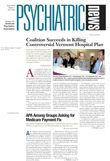Rep. Dan Burton (R-Ind.) is convinced that the measles-mumps-rubella (MMR) vaccine can cause autism. He announced his belief at a recent Capitol Hill hearing held by the U.S. House of Representatives’ Committee on Government Reform, which he chairs.
The reason he is convinced that this is the case, he explained, is that only several days after getting the vaccine, his grandson started banging his head against the wall and showing other signs of autism.
Burton isn’t alone in suspecting that the MMR vaccine can trigger autism. He asked some 50 parents of autistic children who were present at the hearing whether their children had come down with autism shortly after getting the MMR vaccine. Most said yes.
A number of parents of autistic children who attended a national conference on autism last summer also voiced their convictions that the vaccine had caused their youngsters’ autism (Psychiatric News, September 7, 2001).
In response, both the National Institutes of Health and the Centers for Disease Control and Prevention (CDC) are undertaking studies that they hope will definitely indicate whether the MMR vaccine can cause autism.
News of the studies was also presented at the autism hearing by Stephen Foote, Ph.D., director of the National Institute of Mental Health’s Division of Neuroscience and Basic Behavioral Science, and Coleen Boyle, Ph.D., associate director for science and public health at the CDC’s National Center on Birth Defects and Developmental Disabilities.
In fall 2000, for instance, the National Institute of Child Health and Human Development, along with the CDC, launched a large study to explore a possible connection between the MMR vaccine and autism. The medical and development records of approximately 1,600 autistic children (including regressive and nonregressive) and a large number of healthy control subjects are being scrutinized to learn whether there is a temporal relationship between receipt of the MMR vaccine and the appearance of autism symptoms.
Results from this study are expected in 2004.
Another study to explore a possible connection between the vaccine and autism is being conducted by the CDC alone. It is based on more than 500,000 children born in Denmark from 1991 to 1998, 82 percent of whom received the MMR vaccine. Results should be released later this year.
The CDC is likewise conducting a large case-control study in Atlanta to assess a possible relationship between receipt of the MMR vaccine and the risk of developing autism. Autism cases for the study were identified through the Metropolitan Atlanta Developmental Disabilities Surveillance Program. Control subjects were selected from the same or similar schools in Atlanta as the children with autism, and they were matched for age and gender. Study results are expected from the CDC this fall.
A fourth investigation of a putative connection between the vaccine and autism is being launched by the CDC. It too looks at the measles virus and will determine whether gene sequences from the measles virus vaccine strain are present in the intestines of some autistic children and might thus have played a causal role in their autism. Researchers decided to pursue this line of investigation because the measles virus has been found in intestinal biopsies taken from some autistic children. ▪
